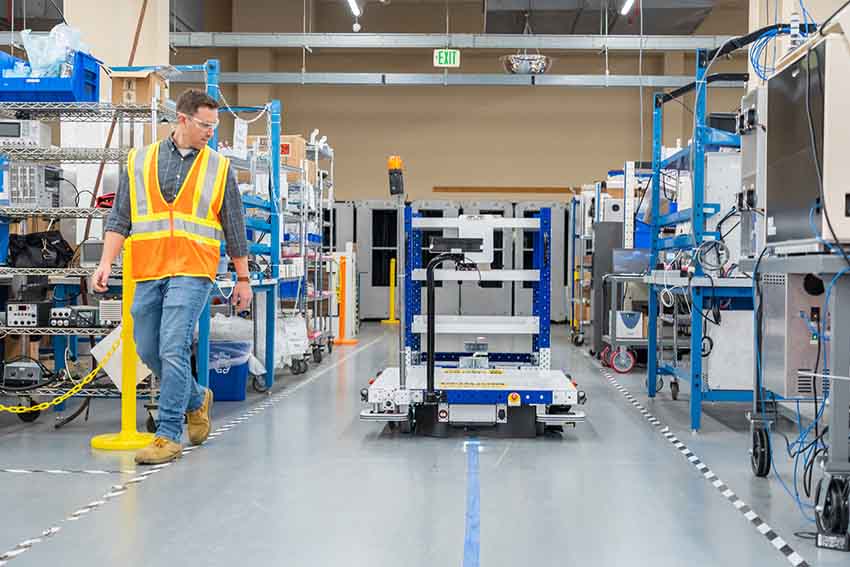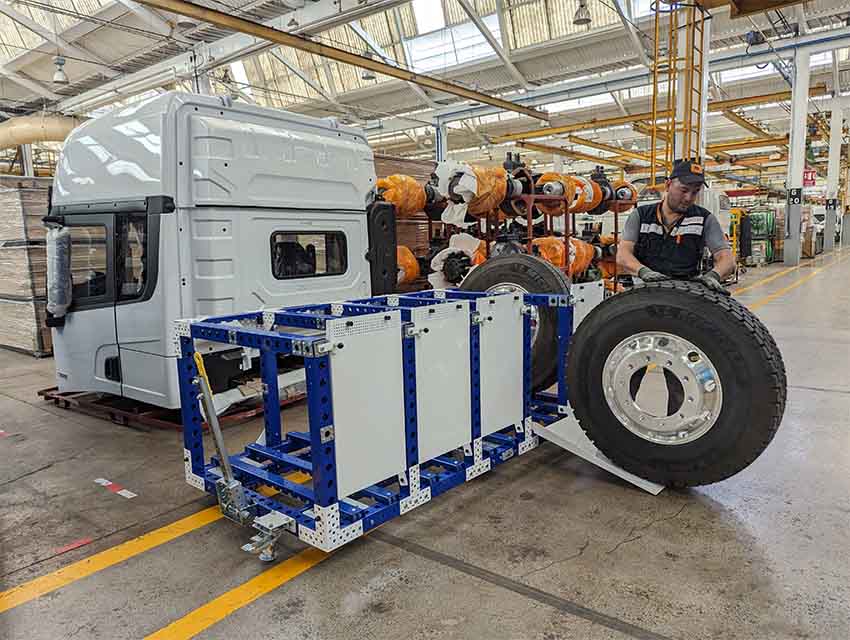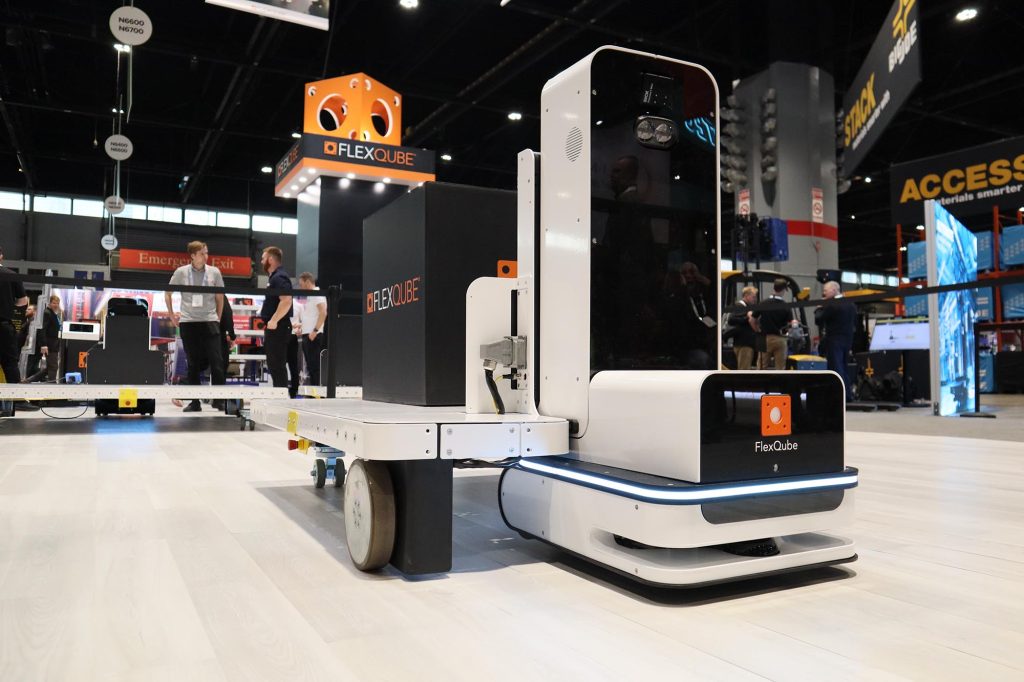FlexQube is a global supplier of modular and robust industrial carts and robots for material handling. The company offers solutions for cart-based material handling using a patented modular concept where they develop and design customized solutions for both robotics and mechanical cart logistics. Through their own unique automation concept, FlexQube also offers robust and self-driving robotic carts.
The group was founded in 2010 and is headquartered in Gothenburg, Sweden, with subsidiaries in the USA, Mexico, Germany, and England. FlexQube has more than 1000 customers in 37 countries, with the primary markets being North America and Europe.
Interview with Agnes Ahlman, Marketing Coordinator at FlexQube.
Easy Engineering: What are the main areas of activity of the company?
Agnes Ahlman: FlexQube specializes in the design, development, and production of material-handling carts and robots with the purpose of helping our customers build world-class products. The product line consists of manual carts, racks, and robots created to provide customers with the safest and most cost-efficient solutions for their internal material handling logistics. Additional services we provide include custom design, virtual and/or live product demonstrations, product installation as well as aftermarket services.

E.E: What’s the news about new products?
Agnes Ahlman: Our latest product is the FlexQube AMR system. It is the world’s first non-load-carrying AMR, which enables the robot to move freely and docks into carriers through a standardized coupling. The FlexQube AMR system is built on „Robotics that delivers” which includes two clear goals of the system:
- Deliver material to people who assemble products, where ergonomics, efficiency, and safety become extra important as the robot works along-side humans.
- Deliver as promised focusing on an easy configuration and maneuverability for reliable transportation.
E.E: What are the ranges of products?
A.A: FlexQube has created and delivered over 6000 material handling carts to customers worldwide. The product line is divided into the segments of Cart-, AGV-, and AMR-systems, all designed to provide smart, scalable, safe, and successful material handling solutions.
The Cart system consists of mechanical carts, racks, and workstations with the focus on combining our applications with our mechanical building blocks to solve customers’ transport and material presentation challenges.
The AGV system (Automated Guided Vehicles) is designed to offer a flexible, cost-effective, and user-friendly automation concept that customers can easily implement themselves. It consists of standardized building blocks but is additionally equipped with smart modules that enable it to navigate using a line-follow system. The AGV system enables all FlexQube carts, new and already existing, to become self-driving.
The AMR system (Autonomous Mobile Robot) is developed on the principle of “one robot for multiple carriers” which enables the robot to move freely and docks into modular and scalable load carriers with a standardized coupling interface. This creates flexibility for operators to transport a wide variety of materials.

E.E: At what stage is the market where you are currently active?
A.A: The material handling industry is in a constant state of evolution, with advances in technology, new products, and systems being developed all the time. Compatibility with other systems, safety, and efficiency are all essential criteria for success. Automation is becoming more widely adopted. However, robots have yet to be widely adopted in factories and manufacturing.
With Industry 4.0 and the concept of the ’future factory’, logistic processes are increasingly becoming used, with automated transport systems improving efficiency, accuracy, and safety. With Industry 4.0, the automation of logistics is becoming a key focus, with more automation, data tracking, and forecasting being used.
E.E: What can you tell us about market trends?
A.A: The most significant trend in the manufacturing industry is based on the demand for customized and personalized products. All major manufacturers are thus shifting the focus of their processes to become more flexible, efficient, and sustainable as many manufacturers have a wide variety of products within the same assembly line.
In relation to these trends, FlexQube stands in an ideal position as a supplier of application-specific carts and robotic solutions for customers in a large diversified market with an endless number of requirements.
E.E: What are the most innovative products marketed?
A.A: Our most innovative product marketed is the FlexQube AMR. We have used our evolving cart-based knowledge and experience to develop robotics that brings transformative change to modern manufacturing.
Based on this, we designed and created an AMR system that is a smart choice for streamlining internal logistics, improving workflows and ergonomics. It’s a safe investment due to its people-friendly concept, as well as scalable thanks to the standardized interface which can easily be adapted to changing facility needs. Also, the AMR is easy for customers to implement, offers a hassle-free environment, and has great ROI leading to successful material handling.
Thus, the FlexQube AMR creates flexibility and high safety for our customers to move anything anywhere, which is critical in today’s manufacturing environment, which is why it’s our most innovative product marketed.

E.E: What estimations do you have for 2023?
A.A: There are a lot of exciting steps that we will take in 2023. We will continue along the path toward becoming the leading global supplier of material-handling carts and robots for internal logistics. We strive to ensure that FlexQube offers the best solutions for tomorrow´s manufacturing-, factory- and distribution logistics.
In 2023 we will also put focus on automation processes and the robotics journey ahead. The newest product within the AMR system segment, called FlexQube AMR system, will officially be launched, which will be a big step toward our long-term vision of having future factories with flexible and self-driving material handling robots and carriers.

